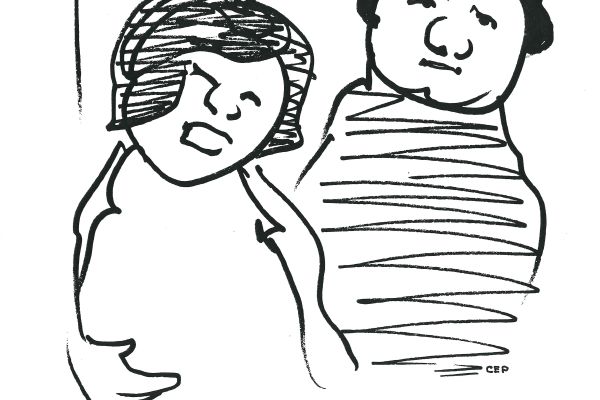Discipline, Punishment, and Rewards
Parents have a responsibility not only to provide for their children but also to teach them the practical and psychological skills they will need to be well-functioning adults. To that end, parents set their expectations for and try to model appropriate behavior. They often reward obedience and respect, and they may use discipline to correct a child who acts in an inappropriate or unsafe way. Discipline, punishment, and reward are all part of the parental toolbox to be used when and how the situation warrants.
On This Page
Parents are responsible for keeping their children safe and to guide them toward safe and appropriate behavior. Meeting those goals requires establishing a secure relationship and introducing age-appropriate discipline. Generally, when people think of discipline in families, their thoughts turn to punishment—time outs, grounding, denying certain privileges, etc. But discipline, research consistently shows, is often more effective when it’s positive and focused on teaching and obtaining rewards rather than avoiding punishment.
Most relationships experience conflict at some point, but when a parent and child are locked in a power struggle, no one wins. Effective parenting is not about controlling a child, nor does it mean trying to change a child’s nature to fit with preconceived notions about what constitutes a “good kid." Instead, effective parents set expectations and standards for behavior and then take the time to help their children meet them. They also make an effort to listen and to understand on a fundamental level how their child’s needs differ from their own.
When a child's or teenager's behavior is dangerous to themselves or others, parents need to persuade them to change. However, the word “no,” when constantly repeated, can harm a young person's self-esteem. If children and adolescents constantly receive negative feedback without any positive reinforcement, they may start to internalize negative beliefs about themselves and feel that they can never do anything right; as a result, they may stop trying, or even adopt self-harming behaviors. Parents and caregivers need to recognize that their words hold greater weight with children and teens than they may realize—or than their kids let on.
Time-outs may be good for adults, but they may not benefit kids, especially at an age when they haven’t yet developed strong emotion-regulation skills. Time-outs are nonviolent, but they are still a form of punishment. A child in time-out typically feels socially isolated and rejected, and they may come to believe that their parents’ love is conditional upon certain behaviors. Time-outs erode the trust between a parent and a child, teaching kids that they have to hide difficult feelings, or they will be banished from their family’s presence. Stopping an unwelcome behavior often isn’t worth the long-term cost to the parent-child bond and the child’s self-esteem.
Many parenting experts agree that time-outs need a time out. Instead of sending a child to another room, they suggest focusing on discipline that sets limits and re-directs the child to healthier responses in the moment. In this way, kids can learn to talk through their intense feelings, and eventually better manage them. This type of discipline has the added advantage of keeping the parent or caregiver physically close to the child, strengthening their connection rather than jeopardizing it.
Parents are often quick to become angry or annoyed with a whining child, but there are better ways to respond to kids’ whining. For starters, be aware that children and teens whine for different reasons: to get help or resources they urgently need, to receive more positive connection, to express unpleasant feelings, or to get rewarded with a parent’s immediate attention. If parents can identify the need behind their child’s whining, they can meet it more quickly and effectively. A positive, loving response is more likely to soothe a child and secure the relationship than an angry or frustrated one.
Rebellion is a natural part of growing up as a child learns to forge their own identity independent from parents and siblings. Adolescents who don’t want to be treated as a child anymore might rebel as they try to figure out how they want to define themselves. When taken to extremes, rebellion in adolescence can cause young people to act against their own self-interest, engage in behaviors that are self-destructive or self-defeating, take greater risks, allow their impulses to override their good judgment, and sometimes damage their closest relationships. Parents can help young rebels by listening to what they need, allowing them to experience the natural consequences of their mistakes, and providing continuous compassion and understanding.
It’s not unusual for parents to set clear limits and consequences and then not follow through. Children learn quickly if a parent is inconsistent and are more likely to take risks when they think there’s a possibility that they won’t be disciplined. Other adults in the child’s life, including relatives and babysitters, also need to be on board with the parents’ rules and enforce them consistently. If a child won’t respond to rules or consequences, parents can try using a chart system to keep their child organized and reward desirable behaviors. They can also take a deeper look at the consequences they’ve chosen and ask whether they are suitable and strong enough motivation.
Many parents will deprive their children of something they value when they misbehave (e.g., grounding, taking away a cellphone or computer, etc.). For this to be an effective punishment for the adolescent, parents need to follow a few guidelines: Don’t take away every freedom the child has; don’t deny them access to a pillar of self-esteem, such as a sport or special interest; don’t cut off all social contact; keep the punishment short. Some parents will find it more effective to insist the child or teenager make reparation by fulfilling tasks at home or community service. These punishments only work if, once they have been completed, the parents don’t refer to the misbehavior again.
Children need a stable, safe environment with rules and consequences they can count on. However, parents often fall into a pattern where one is kinder and more nurturing and the other is the stricter disciplinarian. The inconsistency with which the two parents approach their child’s emotions and behavior can be both confusing and upsetting for the child. A healthier parenting dynamic can develop once parents get on the same page about shared values and how to handle discipline and rewards.
While it may seem counterintuitive, regularly rewarding a child for good behavior, whether that means with a material gift or verbal praise, tends to backfire. Praise and rewards can make a child feel like their parents’ love is conditional—they may become obsessed with achievement and avoid any activity where they have to work harder and run the risk of failure. As a result, they miss out on opportunities to grow and try new things.
Praise and rewards prove most helpful when they are doled out in small doses or for special emphasis. Parents will find positive encouragement and discipline to be more effective ways of getting their child to behave well. In response, children will develop a growth mindset and greater confidence in their own skills, which will only benefit them as they mature into adults.
Positive encouragement motivates children and teens to repeat helpful behaviors better than criticism does and, as a result, should be used more frequently. But praise can be tricky. Every parent needs to know that while praise feels good in the moment, it can sabotage kids in the long run when it makes a judgment about a child’s overall abilities (e.g., “You’re a genius!”). Children may be so fearful of losing their parents’ approval that they stop trying new things and lose confidence in themselves. A better approach to praise is noting effort rather than focusing on achievements (“You’ve really been working hard at learning those numbers, and you can count higher today than you could last week!”); this also facilitates a growth mindset that benefits children as they grow older.
Praise is a common form of recognition and encouragement in many different kinds of relationships, not just that of parent and child. It’s natural to want others to have a good opinion of you, and praise fulfills that basic human need. Many experts believe that parents should praise their children to strengthen familial bonds, promote prosocial values, and provide the emotional support we all need.
Education critics like Alfie Kohn argue that it’s a bad idea to praise children, no matter how good the intention. They view all types of praise from an adult as a type of extrinsic reward that undermines any intrinsic motivation a child has for repeating a specific behavior; a child only acts in the desired way when they can be sure of receiving more praise. Thus, praise becomes a form of control in the relationship.
Praising a child’s character (“You’re so great!”) instead of their effort or behavior (“You studied hard and did a great job on that test!”) links their success to their sense of identity. So if the next test is more difficult for them, or they don’t do as well on it, they feel like they have failed as a person. Praising children with low self-esteem can backfire since they are more likely to experience shame and disappointment as a result of future failures.
Children need positive encouragement and emotional support that doesn’t feel conditional. Parents who are wondering what to say instead of praising can try explaining how their child’s actions affected someone else (“Look how happy your friend is to have a turn with your toy!”), noticing their effort (“You tried hard, and you got a good grade!”), and sharing their own feelings about their child’s behavior (“I loved watching you play soccer today!”). The point is to try to avoid expressing judgment and encourage a growth mindset so that children feel rewarded intrinsically by working their hardest whether they succeed this time or not.
Parents may express disapproval with the goal of teaching their children that behavior is not acceptable or helping them avoid certain mistakes. However, the child tends to feel this criticism as a sign that they will never be good enough to win their parents’ approval. The rebellion of the over-criticized child occurs when a child gives up trying to change and instead becomes angry and argumentative or withdraws completely. In extreme cases, the child may exhibit self-sabotaging or self-harming behaviors. Unrelenting parental criticism can have a lasting impact, making it tough for the child to have healthy relationships as an adult.
According to research, rewarding good behavior often leads to bad behavior. Instead of offering material rewards, adults will have better luck reinforcing a child’s sense of autonomy and competence. Relying on a child’s intrinsic motivation to behave well and get along with others will result in more positive outcomes over time. That’s how people learn to do the right thing even when no one is watching. While the goal should be to build up a child’s intrinsic motivation, tangible rewards used sparingly can help encourage positive behaviors, particularly in younger children.
For parents who worry about the ethics of rewards, be assured that you’re not bribing your kids. A bribe is an incentive for someone to engage in bad behavior, whereas a reward is often used to motivate prosocial actions for the benefit of everyone. Parents can even be upfront with their children that they may sometimes choose to reward good behavior or hard work once in a while, but their kids shouldn’t expect an incentive every time. That way, everyone is on the same page, and rewards can be used to celebrate a special success or milestone.
Parenting experts recommend motivating children without rewards for a number of reasons: Children who are rewarded for good behavior wind up doing it less; an extrinsic reward makes it seem like the behavior is difficult or unpleasant when it doesn’t have to be (like eating vegetables or working out); and children wind up developing a transactional attitude so that they expect an incentive in exchange for behavior they should have anyway (like sharing toys with others or talking to people respectfully). As a result, parents may have better luck raising healthy and well-adjusted children by prioritizing intrinsic motivations over extrinsic rewards.
Like other forms of corporal punishment, spanking is associated with a wide range of negative developmental outcomes for children. Spanking is generally defined as hitting a child with an open hand. Parents may resort to spanking when they feel overwhelmed and need a quick fix in the moment, but spanking does little to resolve problem behavior in the long term and only serves to widen the emotional rift between parent and child. In general, parents benefit from more positive discipline strategies that boost their child’s confidence and self-esteem rather than shaming and humiliating them with physical punishment.
In December 2018, the American Academy of Pediatrics (AAP) recommended that parents not spank their children. Similar to other forms of corporal punishment, the science of spanking shows that not only is spanking ineffective at changing children’s behavior, but it often backfires, increasing negative behaviors like physical aggression. Other methods are more effective at modifying a child’s behavior without causing long-term damage.
Spanking damages the relationship between parent and child. What really happens when parents spank kids is that they incorrectly model for the child that adults can use physical aggression to solve their problems. Children who are spanked may suffer long-term consequences, including mental health problems, lower self-esteem, cognitive dysfunction, antisocial behavior, and anxiety. They are also more likely to use spanking and other physical punishment to raise their own children, increasing the risk of abuse.
Spanking, which is defined as open-handed hitting, is not recommended as a form of punishment for children. Parents who spank are often at a loss for how to get their child to behave otherwise, but research clearly shows that spanking doesn’t achieve the desire result and only serves to harm the child’s mental health. What really happens when parents hit their kids is they are putting themselves at greater risk of losing control and physically hurting their child.














